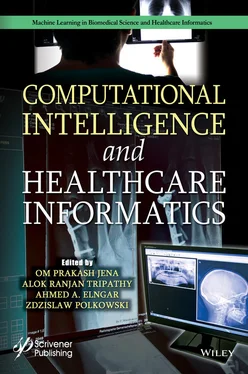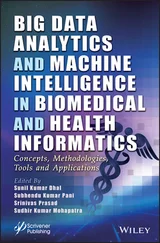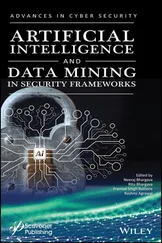– Chapter 16discusses a program developed for collecting heart rhythm, pulse rate, body temperature, and inclination data from patients.
– Chapter 17describes a proposed automatic COVID-19 detection system that can be used as an alternative diagnostic medium for the virus.
– Chapter 18presents an innovative approach for deriving interesting patterns using machine learning and graph database models to incorporate the preventive measures in an earlier state. A graph-based statistical analysis (GSA) model to study the COVID-19 pandemic outbreak’s impact is also proposed.
– Chapter 19discusses the conceptualization of tomorrow’s healthcare through digitization. The objective of this chapter is to utilize the latest resources available at hand to design the case studies.
– Chapter 20provides a systematic procedure for the development of the POS tagger trained on general domain corpus and the development of biomedical corpus in Hindi.
– Chapter 21studies the concepts of neuro-linguistic programming (NLP) used in healthcare applications, and also examines the NLP system and the resources which are used in healthcare. Along with the challenges of NLP, different aspects of NLP are studied as well as clinical methods.
Finally, we would like to sincerely thank all the chapter authors who contributed their time and expertise and for helping to reach a successful completion of the book. Second, the editors wish to acknowledge the valuable contributions of the reviewers regarding the improvement of quality, coherence, and content presentation of chapters.
The EditorsJuly 2021
Part I INTRODUCTION
1
Machine Learning and Big Data: An Approach Toward Better Healthcare Services
Nahid Sami* and Asfia Aziz
School of Engineering Science and Technology, Jamia Hamdard, New Delhi, India
Abstract
Artificial Intelligence has been considered the biggest technology in transforming society. The transformation is highly influenced by the tools and techniques provided by Machine Learning and Deep Learning. One latest discovery is Robotic Surgical Tools like Da Vinci robot which helps surgeons to perform surgeries more accurately and detect distances of particular body parts to perform surgery precisely over them using computer vision assisted by machine learning. The maintenance of health records is a tedious process and ML in association with Big Data has greatly saved the effort, money and time required while processing such records. MIT is working on intelligent smart health record learning method using machine learning techniques to give suggestions regarding diagnosis and medication. Deep mining techniques are used in medical image analysis for the detection of tissue in radiotherapy. Outbreak of several chronic diseases can also be predicted using data gathered through satellite, online information and social media updates. Big Data provides a major part by maintaining the EHR which is in form of complex unstructured data. Another major challenging area is related to the infrastructure of the hospital. Moving toward more advance technologies, the infrastructure need to be updated which is time consuming and costly.
Keywords: Machine learning, deep learning, healthcare, electronic medical records (EMRs), big data
Machine Learning (ML) is a computer program that learns from experience with respect to a particular task assigned and gives result accordingly. The performance of such computational algorithm improves with experience. Health is a major area of concern for everyone and to provide the best healthcare service is becoming one of the major goals of almost every country. But doing that is not an easy task as collecting the medical data and providing it to leverage knowledge so that the best possible treatment can be provided is itself very challenging. So, data plays a crucial part in extracting information and addressing problems related to health. ML has the ability to extract information from the data being provided and further helps in resolving this fundamental issue to some extent.
The huge medical data need to be interpreted and processed by epidemiologists. The input of healthcare providers has been expanded and also created new opportunities due to the availability of huge amount of data related to patients and facility being provided which will further help in achieving the necessary approaches related to prevention and treatment [1]. Due to the complexity of medical data and also lack of technology, the collection was completely ignored in the past. ML algorithm has proved to overcome such difficulties by collecting the medical data securely and further applying it for diagnosis and prognosis. ML has improved several domains like Automatic Speech Recognition (ASR), Natural Language Processing (NLP), and computer vision by using the data. Creating the correct model for maintaining the electronic medical records (EMRs) is a challenging issue due to its availability, quality, and heterogeneity.
Big data is going to play a major role in revolutionizing the healthcare services in the coming future by using algorithm to detect and treat diseases [2]. Its impact on the practice of medicine is fundamentally going to transform the physician ability to personalize care directly to the people. The way to achieve this goal is by collecting data through handheld and wearable devices. This data will be compared with the genetic profile of people and further used for decision-making. The vast medical data needs to be integrated and accessed intelligently to support better healthcare delivery. Big data can create new networks of sharing knowledge by measuring and monitoring processes digitally [3]. Data comparison will be easier which will facilitate streamlined workflows greater efficiencies and improved patient care. Systematic analysis of extensive data can help to detect patterns so that clinicians can provide treatment to individuals and project health outcomes. Digital networks can bring together partners and knowledge sharing delivering context relevant clinical information enables more holistic decision-making. Healthcare can only benefit from big data when it is made structured relevant smart and accessible.
Figure 1.1shows the how ML and big data analytics plays an important role in different fields associated with healthcare services. There are five major modules associated with ML algorithm and their contribution. The physician unstructured data is provided to ML algorithm and, in return, gets better clinical decision support. Also, the radiologist provides data in form of MRI/images and receives diagnostics from ML. It provides the patient a better lifestyle advice and treatment option. Patients are complex module with different genetic back ground so the risks associated with them are different over time. The drug makers get patients medical records for development of necessary drugs. The clinical research and development module provides bio illustration to the algorithm and gets predictive analysis.
1.2 Machine Learning in Healthcare
In recent years, artificial intelligence (AI) has shown tremendous growth in transforming every aspect of life due to its wide range of tools which help in decision-making by analyzing data and integrating information. In terms of technology, Al has stolen spotlight and its advancements are quicker than our prediction [4]. ML being a subset of AI is transforming the world and raising its importance for the society. ML is defined as the study of methods and tools which help in identifying patterns within data and make computer learn without being programmed explicitly. ML can further be used to extend our knowledge regarding current scenario as well as for future prediction by allowing program to learn through experience. It uses the concept of AI for data optimization. Analyzing the best model to make the machine intelligent for data explanation is the goal. We will be discussing here its development in the field of medicine.
Читать дальше












